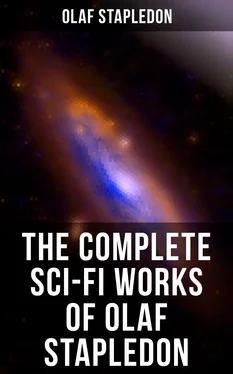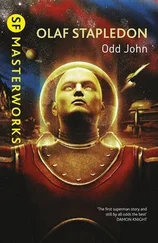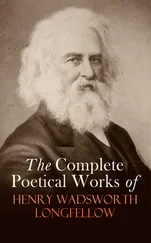Olaf Stapledon - The Complete Sci-Fi Works of Olaf Stapledon
Здесь есть возможность читать онлайн «Olaf Stapledon - The Complete Sci-Fi Works of Olaf Stapledon» — ознакомительный отрывок электронной книги совершенно бесплатно, а после прочтения отрывка купить полную версию. В некоторых случаях можно слушать аудио, скачать через торрент в формате fb2 и присутствует краткое содержание. Жанр: unrecognised, на английском языке. Описание произведения, (предисловие) а так же отзывы посетителей доступны на портале библиотеки ЛибКат.
- Название:The Complete Sci-Fi Works of Olaf Stapledon
- Автор:
- Жанр:
- Год:неизвестен
- ISBN:нет данных
- Рейтинг книги:5 / 5. Голосов: 1
-
Избранное:Добавить в избранное
- Отзывы:
-
Ваша оценка:
- 100
- 1
- 2
- 3
- 4
- 5
The Complete Sci-Fi Works of Olaf Stapledon: краткое содержание, описание и аннотация
Предлагаем к чтению аннотацию, описание, краткое содержание или предисловие (зависит от того, что написал сам автор книги «The Complete Sci-Fi Works of Olaf Stapledon»). Если вы не нашли необходимую информацию о книге — напишите в комментариях, мы постараемся отыскать её.
Novels:
Last and First Men: A Story of the Near and Far Future
Last Men in London
Odd John: A Story Between Jest and Earnest
Star Maker
Darkness and the Light
Sirius: A Fantasy of Love and Discord
Death into Life
Short Stories:
The Flames (1947)
The Seed and the Flower
The Road to the Aide Post
A Modern Magician
East is West
A World of Sounds
Arms Out of Hand
The Complete Sci-Fi Works of Olaf Stapledon — читать онлайн ознакомительный отрывок
Ниже представлен текст книги, разбитый по страницам. Система сохранения места последней прочитанной страницы, позволяет с удобством читать онлайн бесплатно книгу «The Complete Sci-Fi Works of Olaf Stapledon», без необходимости каждый раз заново искать на чём Вы остановились. Поставьте закладку, и сможете в любой момент перейти на страницу, на которой закончили чтение.
Интервал:
Закладка:
The reconstruction of the past, not merely as abstract history but with the intimacy of the novel, thus became one of the main preoccupations of the Fifth Men. Many devoted themselves to this work, each individual specializing very minutely in some particular episode of human or animal history, and transmitting his work into the culture of the race. Thus increasingly the individual felt himself to be a single flicker between the teeming gulf of the never-more and the boundless void of the not-yet. Himself a member of a very noble and fortunate race, his zest in existence was tempered, deepened, by a sense of the presence, the ghostly presence, of the myriad less fortunate beings in the past. Sometimes, and especially in epochs when the contemporary world seemed most satisfactory and promising, this piety toward the primitive and the past became the dominant activity of the race, giving rise to alternating phases of rebellion against the tyrannical nature of the cosmos, and faith that in the universal view, after all, this horror must be right. In this latter mood it was held that the very irrevocability of the past dignified all past existence, and dignified the cosmos, as a work of tragic art is dignified by the irrevocability of disaster. It was this mood of acquiescence and faith which in the end became the characteristic attitude of the Fifth Men for many millions of years.
But a bewildering discovery was in store for the Fifth Men, a discovery which was to change their whole attitude toward existence. Certain obscure biological facts began to make them suspect, on purely empirical grounds, that past events were not after all simply non-existent, that though no longer existent in the temporal manner, they had eternal existence in some other manner. The effect of this increasing suspicion about the past was that a once harmonious race was divided for a while into two parties, those who insisted that the formal beauty of the universe demanded the tragic evanescence of all things, and those who determined to show that living minds could actually reach back into past events in all their pastness.
The readers of this book are not in a position to realize the poignancy of the conflict which now threatened to wreck humanity. They cannot approach it from the point of view of a race whose culture had consisted of an age-long schooling in admiration of an ever-vanishing cosmos. To the orthodox it seemed that the new view was iconoclastic, impertinent, vulgar. Their opponents, on the other hand, insisted that the matter must be decided dispassionately, according to the evidence. They were also able to point out that this devotion to evanescence was after all but the outcome of the conviction that the cosmos must be supremely noble. No one, it was said, really had direct vision of evanescence as in itself an excellence. So heartfelt was the dispute that the orthodox party actually broke off all ‘telepathic’ communication with the rebels, and even went so far as to plan their destruction. There can be no doubt that if violence had actually been used the human race would have succumbed; for in a species of such high mental development internecine war would have been a gross violation of its nature. It would never have been able to live down so shameful a spiritual disaster. Fortunately, however, at the eleventh hour, commonsense prevailed. The iconoclasts were permitted to carry on their research, and the whole race awaited the result.
2. EXPLORATION OF TIME
Table of Contents
This first attack upon the nature of time involved an immense cooperative work, both theoretical and practical. It was from biology that the first hint had come that the past persisted. And it would be necessary to restate the whole of biology and the physical sciences in terms of the new idea. On the practical side it was necessary to undertake a great campaign of experiment, physiological and psychological. We cannot stay to watch this work. Millions of years passed by. Sometimes, for thousands of years at a spell, temporal research was the main preoccupation of the race; sometimes it was thrust into the background, or completely ignored, during epochs which were dominated by other interests. Age after age passed, and always the effort of man in this sphere remained barren. Then at last there was a real success.
A child had been selected from among those produced by an age-long breeding enterprise, directed towards the mastery of time. From infancy this child’s brain had been very carefully controlled physiologically. Psychologically also he had been subjected to a severe treatment, that he might be properly schooled for his strange task. In the presence of several scientists and historians he was put into a kind of trance, and brought out of it again, half an hour later. He was then asked to give an account ‘telepathically’ of his experiences during the trance. Unfortunately he was now so shattered that his evidence was almost unintelligible. After some months of rest he was questioned again, and was able to describe a curious episode which turned out to be a terrifying incident in the girlhood of his dead mother. He seemed to have seen the incident through her eyes, and to have been aware of all her thoughts. This alone proved nothing, for he might have received the information from some living mind. Once more, therefore, and in spite of his entreaties, he was put into the peculiar trance. On waking he told a rambling story of ‘little red people living in a squat white tower’. It was clear that he was referring to the Great Brains and their attendants. But once more, this proved nothing; and before the account was finished the child died.
Another child was chosen, but was not put to the test until late in adolescence. After an hour of the trance, he woke and became terribly agitated, but forced himself to describe an episode which the historians assigned to the age of the Martian invasions. The importance of this incident lay in his account of a certain house with a carved granite portico, situated at the head of a waterfall in a mountain valley. He said he had found himself to be an old woman, and that he, or she, was being hurriedly helped out of the house by the other inmates. They watched a formless monster creep down the valley, destroy their house, and mangle two persons who failed to get away in time. Now this house was not at all typical of the Second Men, but must have expressed the whim of some freakish individual. From evidence derived from the boy himself, it proved possible to locate the valley with reference to a former mountain, known to history. No valley survived in that spot; but deep excavations revealed the ancient slopes, the fault that had occasioned the waterfall, and the broken pillars.
This and many similar incidents confirmed the Fifth Men in their new view of time. There followed an age in which the technique of direct inspection of the past was gradually improved, but not without tragedy. In the early stages it was found impossible to keep the ‘medium’ alive for more than a few weeks after his venture into the past. The experience seemed to set up a progressive mental disintegration which produced first insanity, then paralysis, and, within a few months, death. This difficulty was at last overcome. By one means and another a type of brain was produced capable of undergoing the strain of supra-temporal experience without fatal results. An increasingly large proportion of the rising generation had now direct access to the past, and were engaged upon a great re-statement of history in relation to their first-hand experience; but their excursions into the past were uncontrollable. They could not go where they wanted to go, but only where fate flung them. Nor could they go of their own will, but only through a very complicated technique, and with the cooperation of experts. After a time the process was made much easier, in fact, too easy. The unfortunate medium might slip so easily into the trance that his days were eaten up by the past. He might suddenly fall to the ground, and lie rapt, inert, dependent on artificial feeding, for weeks, months, even for years. Or a dozen times in the same day he might be flung into a dozen different epochs of history. Or, still more distressing, his experience of past events might not keep pace with the actual rhythm of those events themselves. Thus he might behold the events of a month, or even a lifetime, fantastically accelerated so as to occupy a trance of no more than a day’s duration. Or, worse, he might find himself sliding backwards down the vista of the hours and experiencing events in an order the reverse of the natural order. Even the magnificent brains of the Fifth Men could not stand this. The result was maniacal behaviour, followed by death. Another trouble also beset these first experimenters. Supra-temporal experience proved to be like a dangerous and habit-forming drug. Those who ventured into the past might become so intoxicated that they would try to spend every moment of their natural lives in roaming among past events. Thus gradually they would lose touch with the present, live in absentminded brooding, fail to react normally to their environment, turn socially worthless, and often come actually to physical disaster through inability to look after themselves.
Читать дальшеИнтервал:
Закладка:
Похожие книги на «The Complete Sci-Fi Works of Olaf Stapledon»
Представляем Вашему вниманию похожие книги на «The Complete Sci-Fi Works of Olaf Stapledon» списком для выбора. Мы отобрали схожую по названию и смыслу литературу в надежде предоставить читателям больше вариантов отыскать новые, интересные, ещё непрочитанные произведения.
Обсуждение, отзывы о книге «The Complete Sci-Fi Works of Olaf Stapledon» и просто собственные мнения читателей. Оставьте ваши комментарии, напишите, что Вы думаете о произведении, его смысле или главных героях. Укажите что конкретно понравилось, а что нет, и почему Вы так считаете.












